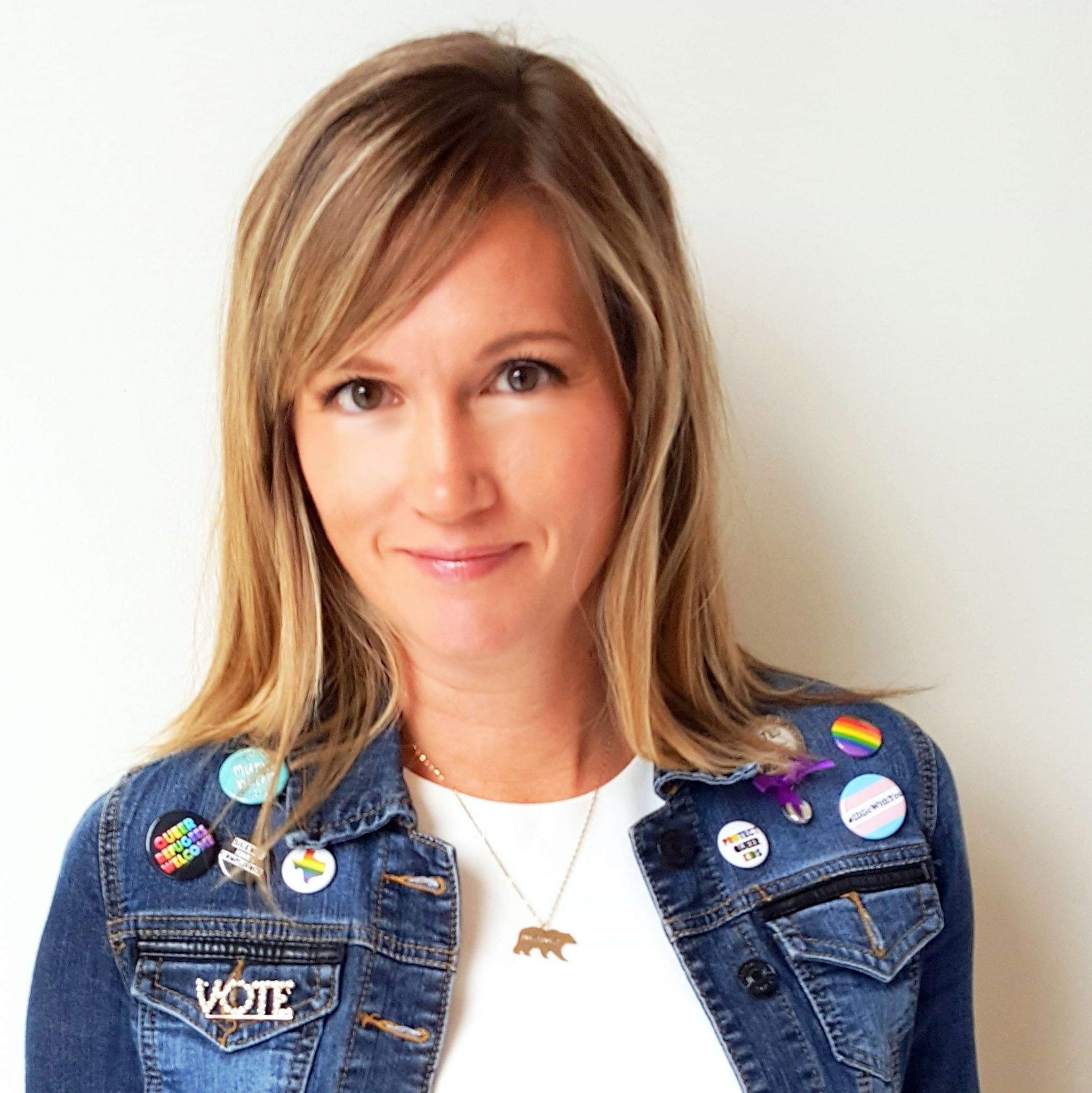In February 2022, Texas governor Greg Abbott instructed the Texas Department of Family and Protective Services to investigate parents of trans youth for providing gender-affirming care for their children. This directive shortly followed a legal opinion from Ken Paxton, Texas attorney general, who declared that gender-affirming care is a form of child abuse. As a result of these political initiatives in the state of Texas, supportive and loving parents of trans children are enduring hateful accusations of abuse for simply providing medical care. At least nine investigations were opened—one of which regarded Amber Briggle.
A Dallas-area mother to a trans son, as well as an activist for trans youth, this dedicated parent is using her voice, her growing platform and her unconditional love for her kids to advocate for protecting trans youth in Texas and across the U.S. She is currently suing Greg Abbott, along with other parents who are members of the national LGBTQ+ organization PFLAG. While it is still unclear how the judge will ultimately rule, as of September 2022, the lawsuit has led to the halting of these investigations—a victory for parents like Briggle. “I just do what I need to do to protect my kids,” she says.
Although Republican politicians have accused Briggle of child abuse, the real environment in her household is nothing but nurturing. Over a decade ago, Briggle’s son came out to her as trans before age four, and socially transitioned in the first grade. After Briggle and her husband accepted their son’s name and pronouns, his reading scores jumped three levels in only three weeks. Now at age 14, he’s an excellent student and athlete with good health and self-esteem, who also has the unique ability to “play any instrument you put in his hands.” Briggle says, “Nothing significant about him has changed other than being more confident in who he is.”
“You can’t stop kids from being trans, you can just make them miserable and dead.”
Briggle’s parenting speaks to the research-supported benefits of growing up in a gender-affirming household, which is critical to the mental health and well-being of trans youth. However, these stories aren’t frequently told in the mainstream media. More often, we see trauma-centred stories which, according to Briggle, can fuel politicians’ views that trans children need to be “saved” from their transness by banning puberty blockers. Briggle says, “You can’t stop kids from being trans, you can just make them miserable and dead.” She believes that seeing more stories of trans kids thriving due to a supportive environment would change a lot of hearts and minds.
While Briggle has always been a devoted “mama bear” when it comes to her own two kids, her rise in prominence as an advocate for trans youth is more recent. She began speaking out publicly in 2016 when Tracy Murphree, a candidate then running for sheriff in the Dallas area, posted threatening, violent content about trans women on Facebook. Briggle was quick to challenge him. She says, “I was naive and young and thought he would apologize. He just said ‘I’m sorry you feel that way.’” After that, Briggle faced words of hatred from complete strangers on the internet, accusing her of child abuse and mental illness and misgendering her child. “It was gross,” she says. “If I was receiving this hate, what must it be like for actual LGBTQ2S+ people? I had to fight back.” After this incident, Briggle worked to get news stories written about her family, spoke at press conferences and events like the GLAAD Media Awards in 2022 and got invited to the White House. Although Briggle is only one of thousands mothers of trans kids across the country, she was a leader in speaking out publicly.
Briggle grapples with whether or not to remain in Texas. Unlike many other parents of trans children, Briggle has never used a pseudonym. Things seemed more hopeful during the Obama era, she says, which made privacy a non-issue. But now, as a public figure in the current political climate, which is “actively hostile to [her] family,” many people have encouraged her to leave the state. Briggle’s response to these well-meaning supporters is that trans safety is not only an issue in Texas. She names tragedies such as the Club Q shooting in Colorado as evidence that violence against trans people also occurs in blue states. So, for now, she’s staying put in her Texas home and working tirelessly to make things better.
Despite the challenges that come with advocacy, Briggler’s activism has also generated positive attention from those in the public who care about trans rights. She comments, “I give personal messages of hope and validation in my emails to moms and people writing to me and thanking me for being so public.” These messages of hope and increased awareness have been “tiny bright spots” for Briggle and her family. She says “The Department of Family and Protective Services (DFPS) investigation was the worst, most traumatic thing I’ve ever gone through, and at the same time, a lot of good has come out of it. People are finally paying attention to what’s happening to trans kids in Texas. And people are shocked.”
In addition to the nationwide attention Briggle has received, her activism has helped her to form meaningful connections with other parents of trans kids in the state. Briggle explains, “In Texas, we [parents of trans kids] are very well organized and very connected.” She shared that a few weeks ago, she hosted a meetup of families with trans kids in Texas, and 30 people arrived from all over the state, with some driving more than an hour away to spend time with each other. When one group member’s family faced a lengthy trial a few weeks ago to advocate for their trans kid, Briggle shared that the moms would text daily: “How are you doing, Mama?” to show support and solidarity. “Moms are tight!” she says. “We look out for each other and each others’ kids. It doesn’t matter if it’s a red or blue state.”
At this point in her activism, Briggle is done trying to reach politicians who aren’t willing to learn. “They’ve already made up their minds,” she says. Instead, she focuses her energy on the public, encouraging them to ask themselves what they can do to help. “I’m just one mom in Texas working to stop genocide of trans kids, and I can’t do it alone. I really need cis people to step up.” She encourages everyone to use their talents in service of trans kids, whether it’s writing letters to politicians, going to school board meetings or retweeting trans activists. “Don’t leave it up to LGBTQ2S+ kids and their parents,” she says.
At the end of the day, before she is an advocate for trans rights, Briggle identifies herself as a mother. Her love for her children, and her unstoppable advocacy for them across is making waves in the fight to protect trans youth. In the simple, yet powerful words of Briggle, “If it’s hard to love your kids, you’re doing it wrong.”


 Why you can trust Xtra
Why you can trust Xtra


